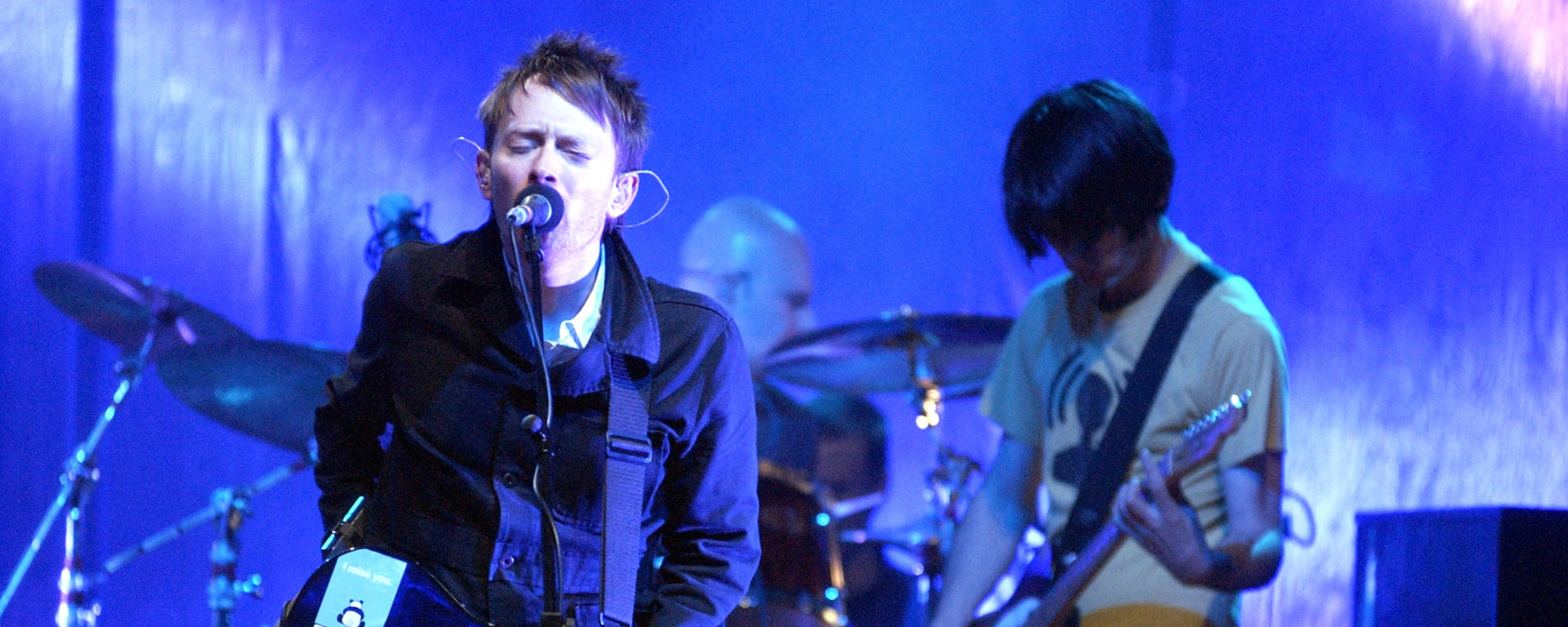In the 1990s, the idea of licensing music to a TV show or advertisement was anathema to alternative rock bands. Nobody wanted to “sell out,” even after they had already signed to major record labels and filmed expensive music videos for MTV. This tension between punk ethos and ambition helps explain why so many 90s artists looked like they were having a terrible time being rock stars.
Videos by American Songwriter
However, now when a song appears in a TV show or film, it gives new life to decades-old releases. Radiohead’s “Street Spirit (Fade Out)” and its inclusion in episodes of Yellowjackets and The Handmaid’s Tale have introduced new audiences to one of the band’s best albums, The Bends.
Radiohead’s second album began a march away from its early sound. “Street Spirit (Fade Out)” is—literally and metaphorically—a band caught between two worlds.
About “Street Spirit (Fade Out)”
Yorke said “Street Spirit” was inspired by Ben Okri’s 1991 novel The Famished Road. The magic realism of Okri’s book, and its blending of the spiritual and material worlds, describes a character torn between mortality and immortality.
This machine will, will not communicate
These thoughts and the strain I am under
Be a world child, form a circle
Before we all go under.
In what may be Yorke’s darkest tune, the fragile line between life and death consumes him. Abstraction and anxiety are regular features of Yorke’s songwriting, and “Street Spirit” consists of both in fragmented thoughts. The only thing connecting them is utter hopelessness.
Cracked eggs, dead birds
Scream as they fight for life
I can feel death, can see its beady eyes.
R.E.M.
R.E.M. inspired the iconic chord sequence in “Street Spirit”. Yorke told Brian Draper in 2004 that he “ripped them [R.E.M.] off left, right, and center for years.” Guitarist Ed O’Brien recorded the cycling chord progression, which feels endlessly unresolved.
Its minor arpeggios match Yorke’s despair. The emotional power of “Street Spirit” has also made it a favorite among music supervisors, as heard in hit TV shows Yellowjackets and The Handmaid’s Tale. There aren’t many bands better equipped than Radiohead when you need music to distill the nihilism of a high school girls’ soccer team abandoned in the woods, or perhaps a song that captures the dystopian mood of Gilead.
The Bends arrived in 1995 during the height of Britpop. But Radiohead, instead, drew from America’s alternative rock bands like Pixies, R.E.M., and Pavement. Then, after watching Jeff Buckley perform in a London club, Yorke began embracing his falsetto.
“Fake Plastic Trees” showcases Yorke’s new singing style but also his vulnerability. He was bashful to share such exposure with his bandmates, but eventually gave in. It’s also part of what makes The Bends so great. And the album concludes with “Street Spirit”, which also similarly exposes Yorke in one of Radiohead’s most powerful songs.
‘The Bends’
Radiohead’s first single, “Creep”, remains the band’s defining song. Yet, it’s definitive not only due to its popularity. But the hit single forced a reckoning. It began a constant shift away from what made them famous. To such a point that Yorke deconstructed the entire project and reimagined the very idea of a rock band.
Once Radiohead had released The Bends, they moved on to something new. Some fans may wish for Radiohead to return to its alternative rock roots, but Yorke’s curiosity keeps him moving forward, to jazz, classical, and experimental electronic music.
Speaking of being caught between two spheres, Okri’s protagonist, Azaro, in The Famished Road, wants to live his life, but the spirits are trying to bring him back to their world. He’s named after the biblical figure Lazarus, whom, according to the New Testament, Jesus raised from the dead.
But notice the “Fade Out” bit in the title of “Street Spirit”. Yorke gives the doomed ending away even before a single note is heard. He then works backward from the hopeless premise. The track builds with layered voices, echoing, possibly, Azaro’s spirits.
If you were to send one Radiohead song to alien worlds, “Street Spirit” more than “Creep” might be the better choice. Better to send a solemn hymn out into the abyss.
Photo by Theo Wargo/WireImage












Leave a Reply
Only members can comment. Become a member. Already a member? Log in.